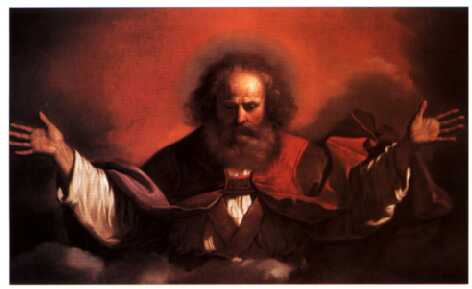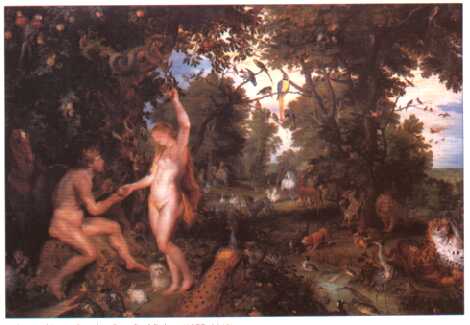Adam (אדם) and Eve (חוה)
The 1rst human beings
Made: 4114 BC (NASB) in Eden (Ussher: 4004 BC)
Died: 3184 BC (Adam) East of Eden
Children:
Cain b4113 BC (possibly Sargon)
Abel b4112 BC (killed by Cain 3984)
Seth b3984
many others (Gen. 5:4)
Images from WWIB p102 (top), p91 (bottom) ===>> |

God the eternal father, Giovanni Guercino (1591-1666)

Adam and Eve in Paradise
Peter Paul Rubens (1577-1640) |
The names Adam and Eve occur in the OT xxx and xxx times (see BibHeb1K). "On the 6th day ... God made [Adam and Eve]. He carefully shaped Adam [lit. the 'man'] from earthly clay [Heb. 'adamah'], breathed life into his body, and made him a living person. He made a garden for Adam in Eden and instructed him to take care of it. God brought the animals and birds to Adam so that Adam could name them. Adam's world was pleasant and harmonious, but he was alone. God then created a woman, Eve [Heb. 'chava'], from Adam's rib, and Adam and Eve lived and worked together in the garden. Earlier, God had warned Adam not to eat the fruit from the tree of knowledge of good and evil. But the serpent persuaded Eve to try the fruit; she, in turn, gave some to Adam. Immediately, they felt ashamed of themselves and their nakedness and covered themselves with leaves. At the time of the evening breeze, God was walking in the garden. Feeling guilty and anxious ... Adam and Eve hid from their creator. God confronted them ... He cursed the serpent to crawl forever on its belly in the dust; he confined the woman to painful childbearing and to potential domination by Adam; and he handed Adam over to a life of unending hardship as a farmer. Then God banished the pair from Eden forever. With their actions, Adam and his family brought sin and death into the world. After their expulsion, Adam and Eve had 3 sons - Cain, Abel, and Seth [others?]. Their descendants formed a line of redemption and blessing, down to Noah and his sons - particularly Shem - and on through Jesus Christ. The apostle Paul emphasized the spiritual relationship between Adam and Jesus, saying the 1rst man was an example of disobedience and death, while Christ - the 2nd Adam - was the ultimate example of obedience and eternal life" (WWIB pp16-7).
Dates by Ussher:
- 4004 BC, Adam and Eve (and everything else) created
- Sa* 21 Sep evening, world created (1rst day, light from darkness)
- Su 22 Sep 1st full day (2nd day, sky from earthly waters)
- Mo 23 Sep (3rd day, land from oceans, vegetation)
- Tu 24 Sep (4th day, sun, moon and stars)
- We 25 Sep (5th day, birds and marine animals)
- Th 26 Sep (6th day, land animals and Adam/Eve)
- Fr 27 Sep (7th day, God rested)
- 3874 BC, Cain murders Abel, Seth born to Eve (AW editor notes its now 130yrs after creation, so there could easily be 'hundreds of thousands' of people)
- 3769 BC, Enos born to Seth, worship already corrupted by Cain (murder 95yrs ago), 'children of God' v. 'children of men' (Gen. 4:26 6:1-2)
- 3679 BC Cainan son of 90yo Enos born
- 3609 BC Mahalaleel son of 70yo Cainan born
- 3544 BC Jared son of 65yo Mahalaleel born
- 3382 BC Enoch son of 162yo Jared born
- 3317 BC Methuselah son of 65yo Enoch born
- 3130 BC Lamech son of 187yo Methuselah born
- 3074 BC Adam dies @ 930yo
- 3017 BC 365yo Enoch 'taken' by God, avoids death
- 2962 BC 912yo Seth dies
- 2948 BC Noah son of 82yo Lamech born
- 2469 BC God sends Noah to warn the people, 120yrs to repent (before flood)
- 2349 BC the Flood
The Moody Atlas of Bible Lands (Barry J. Beitzel, 1985, SBC) notes interestingly that the meaning of the word 'Eden' in Hebrew is unclear, since the verb from which it derives does not appear in the OT. In the Septuagint the translators gave it a connotation of 'luxuriant paradise', but this is probably not warranted. It seems more likely to be related to the Sumerian word edinu, meaning the steppe lands of the Mesopotamian valley. The 2 most likely locations would be in Urartu i.e. between Lake Van and the Black Sea (in modern day N Iraq) and near Sumer, where the 2 rivers meet and empty into the Persian Gulf. If the former, the 2 other Biblical rivers (besides the Euphrates and Tigris) Pishon (meaning 'to cascade') and Gihon ('to bubble') could refer to the Araxes and Choruk rivers, whose headwaters emerge from the Urartian highlands only ~1100 yards apart. If the latter, the other 2 rivers would likely be the Kerkha and Karun.
Adam is a key reference figure in the formula: Adam to Noah [#10] in 10 generations, Noah to Abraham [#21] 10g, Abraham to David [#33] 14g, David to Josiah [#49, i.e. Babylonian capitivity] 14g, Josiah to Jesus [#63/75] 14g, for a total of 62 generations from Adam to Jesus in around 4K yrs (see Bible.html, Matt 1:17).
The 8 covenants: Edenic, Adamic, Noahic, Abrahamic, Mosaic, Palestinian, Davidic, New [same as ? ZPEB v1] (Scofield Bible p1)
The 4 OT themes: election, covenant, law, exodus (EHB p122).
The 6 dispensations: infancy (creation to Noah), childhood (Noah to Moses), adolescence (Moses to Prophets) and youth (Prophets to Christ), manhood and old age (Christian era), renovation (millenium), 'fullness of time' (eternity) (ZPEB v2 p145).
Contemporary Events:
- [c10k BC end of (last?) 'Ice Age' generally accepted by secular historians]
- [c9600 BC destruction of Atlantis acc. to Plato]
- [9564 BC Genesis Flood acc. to theosophy (based on Hindu philsophy)]
- [9-7k BC creation acc. to Henry Morris' 'Genesis Flood' w/3-5kyr gap in Ussher dates, flood caused Ice Age]
- [c8k BC melting glaciers -> rising waters cover old civs? separate Bering, England/Europe, Australia/New Guinea/Tasmania, widespread HG -> ag rev -> civ rev]
- c9500 BC prehistoric villages at Jericho and elsewhere in Canaan [and at Catal Huyuk] (WWiB p20)
- c9000 BC people spread to S tip of S America (i.e. to 'ends of earth' DK Civ), goats/sheep domesticated in Persia (WWiB p20)
- c8300-c4500 BC Neolithic Age (Paleolithic 2M-13k, Mesolithic 13k-8.3k)
- c8000 BC 1st evidence of cultivated wheat in Levant, potatos in Peru (WWiB p20)
- c7600 BC 1st signs of floodwater agriculture in Nile Valley (WWiB p20)
- c7500 BC earliest known cemetery in America (FL, WWiB p21)
- c7000 BC Jericho occupied, oldest known city (HAW, see also Gobekli Tepe, Catal Huyuk in Turkey), 1st pottery production (WWiB p22)
- c6400 BC earliest known metallurgy in Near East (WWiB p23)
- c6000 BC farming begins in Nile Valley
- c5700 BC Obsidian trade in Near East (MMiB p24)
- c5400 BC Eridu in existence, thought to be the earliest city in lower Mesopotamia (WWiB p31, just SW of Ur, just S of Ubaid, namesake of earliest Babylonian culture)
- c5200 BC Ubaid culture begins in Mesopotamia (WWiB p24)
- c5100 BC 1st metal tools (WWiB p24)
- c5000 BC 1st sailing ships in Mesopotamia (WWiB p24)
- c5000-c4000 BC Badarian period in Egypt, 1st settlers arrive c5k BC
- c4500 BC sailing boats in Mesopotamia, in Egypt by 4000 BC (DK 'Civ')
- c4500-c3000 BC Chalcolithic Age (i.e. copper and stone)
- 4236 BC 1st date in Egyptian calender (WWiB p25)
- 4000-3500 BC Sumerians settle in S Mesopotamia
- 4000-3200 BC Uruk period in Mesopotamia, Naqada period in Egypt (HAW)
- c3800 BC wheel invented in Mesopotamia, spreads to steppes by 3650, Europe by 3200 (DK)
- 3760 BC 1st year of Jewish calender
- c3500 BC harps and flutes in Egypt, writing and wheel invented in Mesopotamia
- c3500 BC use of gold, silver, copper alloys by Egyptians, Sumerians
- c3500 BC Cretan [i.e. pre-Phoenician] ships dominate Mediterranean (ToH)
- 3500-3000 BC height of Sumerian civ, many 1sts (cf bk 'It All Begins at Sumer')
- 3500-3000 BC musical instruments and numerals in Egypt, potter's wheel and wheeled vehicles in Sumer
- 3373 BC 1st Mayan date
- c3200 BC Scorpion King (aka Narmer, Menes, 1rst 'god-king' pharaoh) unites N/S Egypt
- 3200-2900 BC Jemdat Nasr period in Mesopotamia (indep city-states, HAW)
- c3100 BC 1rst Indian towns along Indus River in NW India
- 3000-2500 BC Phoenicians (from Crete?) settle on Syrian coast w/cntrs Tyre, Sidon
- 3000-2500 BC Gilgamesh Epic, Sumerian gods also worshipped by Egyptians, Hittites, Phoenicians and Scandanavians (proto-Vikings)
- 3000-2500 BC beginning of systematic astronomy observations in Egypt, Babylon, India, China
- c3000-c1200 BC Bronze Age
- c3000 BC permanent settlements on coastal Peru, Megiddo is leading city-state in Canaan (WWiB p29)
- c2800 BC 1rst Chinese towns along Yellow River, Stonehenge construction begins
- 2772 BC 365-day calender adopted (w/o leap-year adjustments)
- c2700 BC Gilgamesh (Nimrod?) conquers his Sumerian neighbors
- 2697 BC Huang-ti, the 'Yellow Emperor' enthroned in China (1st of 'sage kings')
- 2696-2181 BC Egyptian Old Kingdom (Dynasties 3-6)
- r2589-66 23yrs Khufu (Grk Cheops) built Great Pyramid (4th Dynasty, 1 of 7 waw)
- r2558-32 26yrs Khafre (Grk Chephren, son of Khufu) built 2nd largest pyramid (but highest)
- r2532-03 29yrs Menkaure (Grk Mycerinus) built 3rd and smallest pyramid at Giza
- 2296 BC Chinese observe comet 1st time (WWiB p34)
- c2200 BC Akkadian (#2) zenith, Sumerians introduce 12 x 360 calender (WWiB p34)
- 2201 BC Queen Semiramis builds tunnel under Euphrates (WWiB p35)
- 2004 BC Ur sacked by Elamites (end of Sumer, 1rst human civ) and Amorites invade Mesopotamia generally (WWiB p35)
- cf Noah for later dates ...
* By modern reckoning, 21 Sep 4004 BC was exactly 214 28yr cycles before Th 21 Sep 1989, but Ussher says it was a Sa. Hmmm (9/21 is the already-corrected Gregorian date given by Ussher, so no need to go thru my usual conversion).
Sources:
- The Holy Bible
- AW = The Annals of the World, Bishop James Ussher, own
- ZPEB = The Zondervan Pictorial Encyclopedia of the Bible, vol2, 1976, SBC.
- WWIB = Who's Who in the Bible, ed. Dietrich Gruen, PIL, 1995, Mustang.
- OIHB = Oxford Illustrated History of the Bible, ed. John Rogerson, Oxford, 2001, FHL.
- EHB = Eerdmans' Handbook to the Bible, ed. David Alexander, 1973, 680pp, FHL.
- DK Civ = Civilizations: 10k yrs of Ancient History, McIntosh/Twist, 2001, 240pp, Arabian.
- ToH = Timeline of History, author?, publisher?, year?, SBC.
- BN HT = History's Timeline, Barnes & Noble, 1981, own.
- HAW = The History of the Ancient World, Susan Wise Bauer, W W Norton, 2007, Mustang.
- WWiB = Who's Who in the Bible, Jean-Pierre Isbouts, National Geographic, 2013, Mustang.
- see also Egypt, ToN, br-lciv ...

